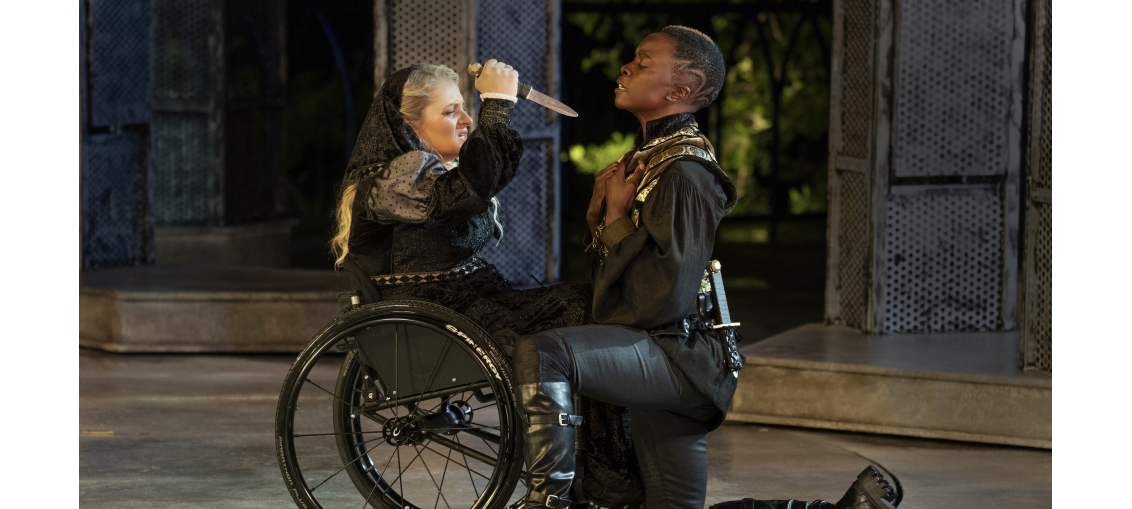
It’s important, if not essential, for theatre makers to be ambitious and take risks. Equally crucial, especially in today’s climate, is considering diversity and inclusion when casting. However, when a production tries to tick all the boxes at once, that can muddle the play’s message.
The latter is the unfortunate result of the production of Richard III, directed by Robert O’Hara and starring Danai Gurira in the title role. Though the efforts and intentions were admirable and excellent performances were given by all, throwing in everything and the kitchen sink made the show fall short of its possible impact by presenting a perplexing portrayal of one of Shakespeare’s most intriguing villains.
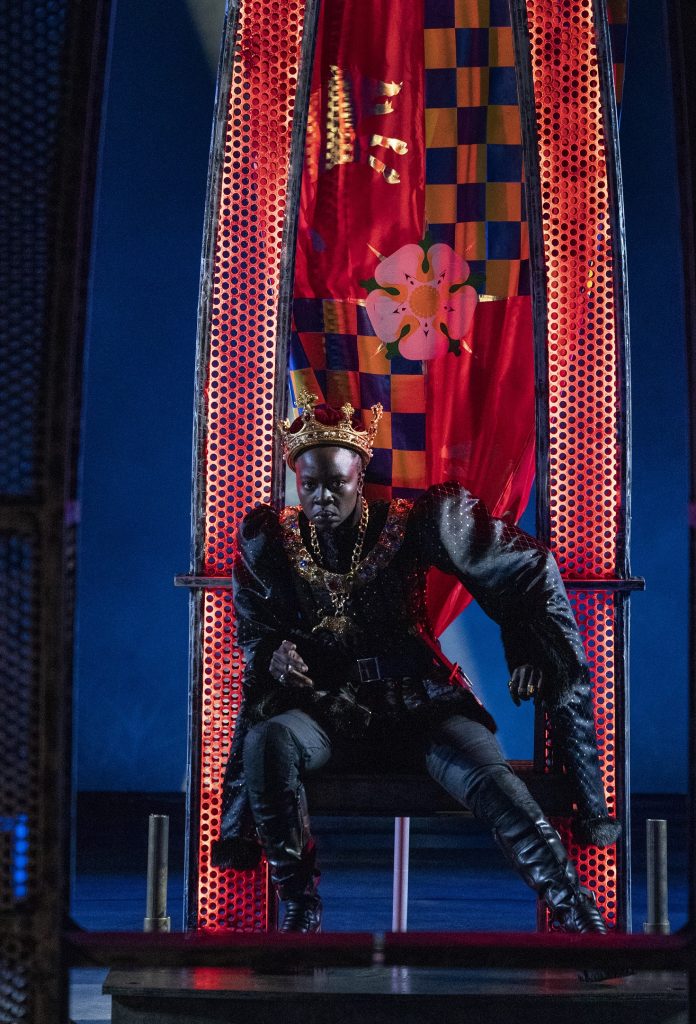
Stage, TV, and film actress and acclaimed award-winning playwright Danai Gurira has undeniable star quality. She’s best known for playing fierce, powerful women like Michonne on AMC’s The Walking Dead and the warrior Okoye in Marvel’s blockbusters Black Panther, Avengers: Infinity War and Avengers: Endgame. On top of that fierceness, Gurira possesses a certain regalness and poise befitting a warrior queen. Whatever she’s in, however large or small the role, you can’t take your eyes off of her.
The same is true of her portrayal of Richard III. And yet, that confident, shoulders-back swagger contrasts the historical Richard III and how Shakespeare envisioned him. The actual Richard III suffered from a severe form of scoliosis, which gave him the deformed appearance mentioned in the text, and his uncomely shape informs how he is perceived and treated by others. This mistreatment has been viewed as a potential catalyst to his villainous ways, which include committing or conspiring multiple murders to achieve and maintain his place on the throne.
Gurira’s Richard III carries the confidence of a king from the beginning. The ugliness is all inside. It’s a different take, that’s for sure, but it was fun to watch Gurira take the reigns of a complex character without resorting to prosthetics or altering her striking look to suit the role.
As an added twist, those around Richard showcase physical differences that would have been seen as hindrances akin to that which the historical Duke of Gloucester suffered ridicule because of. Ali Stroker delivers a feisty, fiery performance of Anne, the widow of one of Richard’s victims, from a wheelchair. Several supporting roles are also performed by actors with other physical differences. For example, Gregg Mozgala, who has Cerebral Palsy, plays King Edward IV (who dies) and Richard’s nemesis, Richmond, who takes the throne and becomes King Henry VII. Matthew August Jeffers is a little person, and Monique Holt (Duchess of York) is a deaf actress who speaks her lines through sign language, sometimes and sometimes not translated aloud by Joe Mucciolo, who acts as her attendant.
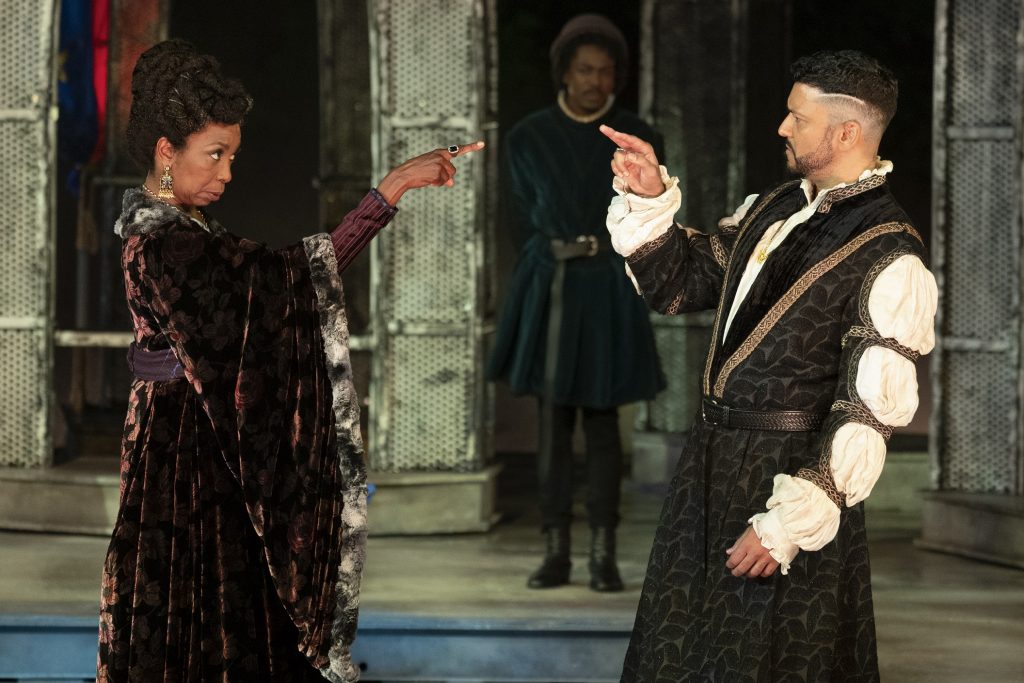
All of the actors gave commanding performances, with Sharon Washington (Queen Margret), Sanjit de Silva (Buckingham), Daniel J. Watts (Radcliffe), and Ariel Shafir (Hastings) as other notable standouts. And it was interesting to see how this Richard was, despite his awful deeds, charming and even sexy. In the famous “your bedchamber” scene where Richard offers the newly widowed Anne (Stroker) an indecent proposal, there’s a lot of playful flirtation and sexual heat, with much more lust than disgust. But there was an underlying confusion about the hierarchy and how Richard fits into it. In most of the ensemble’s interactions with the anti-hero, this Richard seemed to be more of a bullying high school quarterback than the bullied, antisocial loner.
The casting and performance choices for this production of Richard III are also a stark contrast, if not a complete flip, of the Royal Shakespeare Company’s version now playing through October in Stratford-upon-Avon, England. That production is praised for being “The most real Richard III there’s ever been” in a NY Times piece for featuring a disabled actor, Arthur Higgins, born with radial dysplasia, in the title role. Higgins says he can relate to Richard’s struggles and “instantly identified with the role” of a character deemed “not cut out for big parts” because of his looks.”
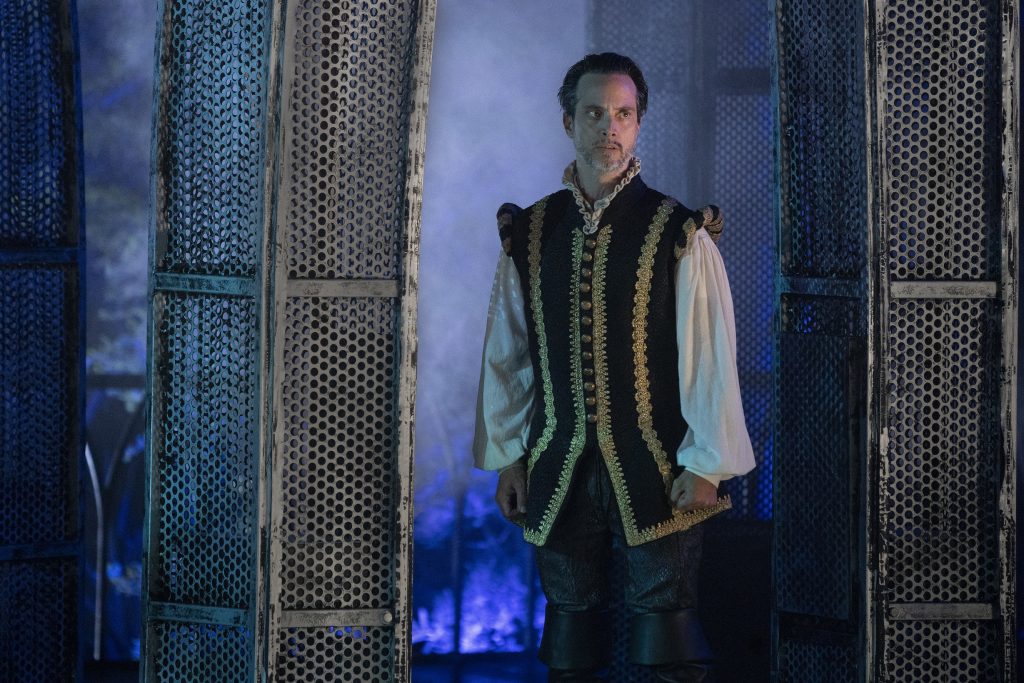
Director Robert O’Hara’s vision of Richard III sees the play as a way to explore nature vs. nurture, where outward appearances may only be a minimal factor in shaping one’s inner world. What is more important is how that person is treated by others. It’s a timely, urgent topic to examine and investigate with all of the mass shootings and wars caused by seemingly “normal” (outwardly, at least) people. The question is: are monsters born or made due to their treatment and circumstances?
Richard III wasn’t born “evil,” he was made a monster by a lifetime of mistreatment, belittling, and being told he’d never be king. What societal influences make a person become a psychopath? What forces chip away at a person’s moral compass to the point where they will murder or conspire to kill (friends, relatives, children) and commit other atrocities (marrying the young sister of slain brothers or the wife of the man you killed)? When does human life (others or your own) become so worthless?
Richard is ignored, overlooked, disregarded, and even spit upon. Provoking fear is the only way he feels and gains power. His cunning and manipulation are the “beta” male’s methods to get him ahead of the alphas. It’s something we have seen in global dictators across the centuries and remains true today.
It’s a brave and bold choice that O’Hara should be commended for exploring, but the production sometimes missed the mark. It’s true, that Richard’s ugliness is a manifestation of his inner life, not his outward looks, and he takes pleasure in tormenting others, even if they are not his tormentors. That’s what makes him so intriguing. But with so much going on with theatrical choices, the intended vision can distract from the text and story due to a lingering feeling that THE MESSAGE is being shoved down the audience’s throats. It’s a delicate tightrope to walk between apathy and thrusting overt “wokeness” at the audience that this production doesn’t consistently achieve. The Public Theater’s Artistic Director, Oskar Eustis, a renowned supporter of risk-taking theatre that often pays off, said to Playbill’s Matt Wolf, “If it succeeds and the metaphor at its center succeeds, it will show us a Richard far more complicated than what we have seen.” An ambitious and bold vision indeed, but it doesn’t always succeed.
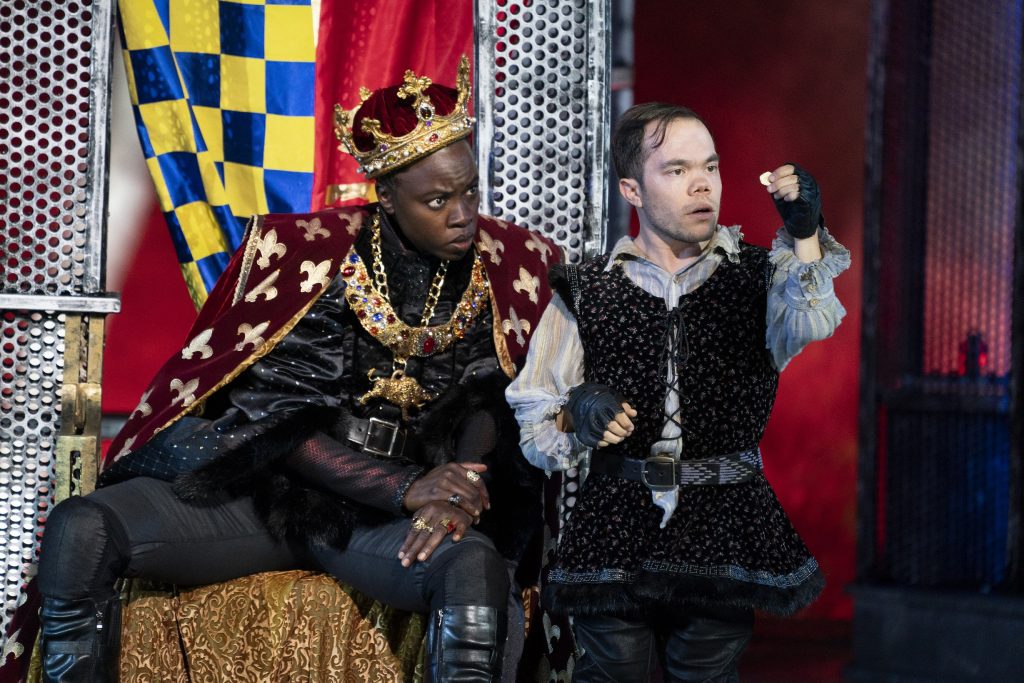
Other choices were hinted at but not explored thoroughly, which might have made for a more compelling and congruent 21st-century production of Richard III. Some elements of the costumes by Dede Ayite were contemporary and urban, while other parts evoke the historical period. And the speech style would veer from classical to modern street sass, which did offer comedic relief but didn’t always match, so it would feel abrupt, inconsistent, or downright goofy (the pronunciation of an assassin for hire Tyrrell as “Ty-rell”). The hip-hop court dance at Richard’s coronation also felt out of place. These choices, intentional or not, felt like a mix of disparate parts and took you out of the world of the play.
The most effective “re-envisionings” of Shakespeare I have ever seen (or almost any modern take on a classic work, for that matter) take one clear, bold element and run with it wholeheartedly. One perfect example is Kenny Leon’s Much Ado About Nothing set in present-day Atlanta, which graced the Delacorte Theater in 2019.
During this production of Richard III, there were fleeting moments where alternative visions of the show occurred to me. For instance, when Gurira in Richard’s coronation crown resembled Brooklyn rapper Biggie Small’s King of NY it made me think of the dangerous and often bloody ‘turf wars” in the rap music industry. What an interesting Richard III that would be! And then there were times when her portal of Richard’s overcompensating bravado echoed the attitudes of African dictators like the Ugandan tyrant Idi Amin or the abusive rebel commanders of war-torn Liberia, the subject of Gurira’s Broadway play, Eclipsed.
All in all, this version of Richard III had moments of brilliance, but never quite came together as a whole to realize the ambitious vision set forth. But as is true for all Shakespeare adaptations and interpretations, beauty (or lack thereof) is in the eye of the beholder.
Performances of RICHARD III will begin on Tuesday, June 21 and run through Sunday, July 17 in The Delacorte Theater. A limited number of tickets are also available via advance reservation by making a contribution in support of Free Shakespeare in the Park. To learn more, or to make a contribution, call 212.967.7555, or visit publictheater.org. The full performance calendar can be found at publictheater.org and complete ticket distribution details can be found at thepublic.nyc/parktix22. The Delacorte Theater in Central Park is accessible by entering at 81st Street and Central Park West or at 79th Street and Fifth Avenue.
 Thursday, November 27, 2025
Thursday, November 27, 2025